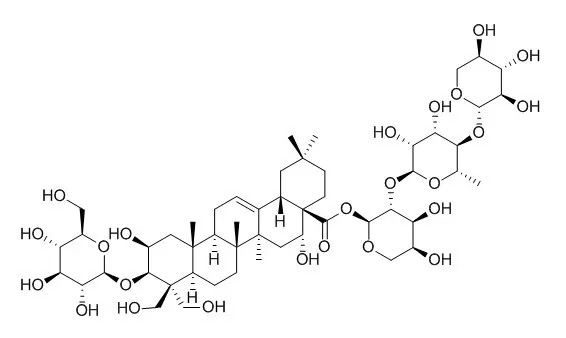| In vitro: |
| Natural Product Sciences, 2008, 14(4):274-80. | | Compositional analysis of major saponins and anti-inflammatory activitiy of steam-processed platycodi radix under pressure[Reference: WebLink] | Platycosides are the saponins in Platycodi Radix and they have several beneficial effects such as anti-inflammatory and anti-obesity activities. This study was designed to determine the changes in the saponin composition in Platycodi Radix (platycosides) after being processed under steam and pressure and to investigate the anti-inflammatory effects of their extracts.
METHODS AND RESULTS:
The change of the platycoside compositions was investigated after 1, 2, 3, 6 and 9h heat processing of Platycodi Radices by using HPLC coupled with an evaporative light scattering detection (ELSD) system. After heat treatment (125 °C, 1, 2, 3, 6 and 9 h), the contents of several platycosides such as platycoside E, platycodin D3, platycodin D, polygalacin D, and platycodin A decreased as the processing time was longer. While the total contents of the saponins decreased, the contents of deapi-forms of deapi-platycoside E, Deapi-platycodin D3, and Deapi-platycodin D increased relatively. These results indicate that the linkage between apiose and xylose located at C-28 is labile to heat and pressure. The LPS-induced iNOS inhibitory activities of the samples treated for 1 and 2 hours were enhanced and after then, the activities were reduced.
CONCLUSIONS:
These results suggested that heat treatment of the samples affect the content of the total saponins and the saponin content may be the important criteria representing the anti-inflammatory activity. | | Evid Based Complement Alternat Med . 2013;2013:560417. | | Triterpenoid Saponins Isolated from Platycodon grandiflorum Inhibit Hepatitis C Virus Replication[Pubmed: 24489585] | | Abstract
Hepatitis C virus (HCV) infection is a major cause of liver disease, including cirrhosis and hepatocellular carcinoma. Due to significant adverse effects and emergence of resistant strains of currently developed anti-HCV agents, plant extracts have been considered to be potential sources of new bioactive compounds against HCV. The aim of this study was to evaluate the functional effects of triterpenoid saponins contained in the root extract of Platycodon grandiflorum (PG) on viral enzyme activities and replication in both HCV replicon cells and cell culture grown HCV- (HCVcc-) infected cells. Inhibitory activities of triterpenoid saponins from PG were verified by NS5B RNA-dependent RNA polymerase assay and were further confirmed in the context of HCV replication. Six triterpenoid saponins (platycodin D, platycodin D2, platycodin D3, deapioplatycodin D, deapioplatycodin D2, and platyconic acid A), PG saponin mixture (PGSM), were identified as active components exerting anti-HCV activity. Importantly, PGSM exerted synergistic anti-HCV activity in combination with either interferon- α or NS5A inhibitors. We demonstrated that combinatorial treatment of PGSM and IFN- α efficiently suppressed colony formation with significant reduction in drug resistant variant of HCV. These data suggest that triterpenoid saponin may represent a novel anti-HCV therapeutic agent. |
|






 Cell. 2018 Jan 11;172(1-2):249-261.e12. doi: 10.1016/j.cell.2017.12.019.IF=36.216(2019)
Cell. 2018 Jan 11;172(1-2):249-261.e12. doi: 10.1016/j.cell.2017.12.019.IF=36.216(2019) Cell Metab. 2020 Mar 3;31(3):534-548.e5. doi: 10.1016/j.cmet.2020.01.002.IF=22.415(2019)
Cell Metab. 2020 Mar 3;31(3):534-548.e5. doi: 10.1016/j.cmet.2020.01.002.IF=22.415(2019) Mol Cell. 2017 Nov 16;68(4):673-685.e6. doi: 10.1016/j.molcel.2017.10.022.IF=14.548(2019)
Mol Cell. 2017 Nov 16;68(4):673-685.e6. doi: 10.1016/j.molcel.2017.10.022.IF=14.548(2019)